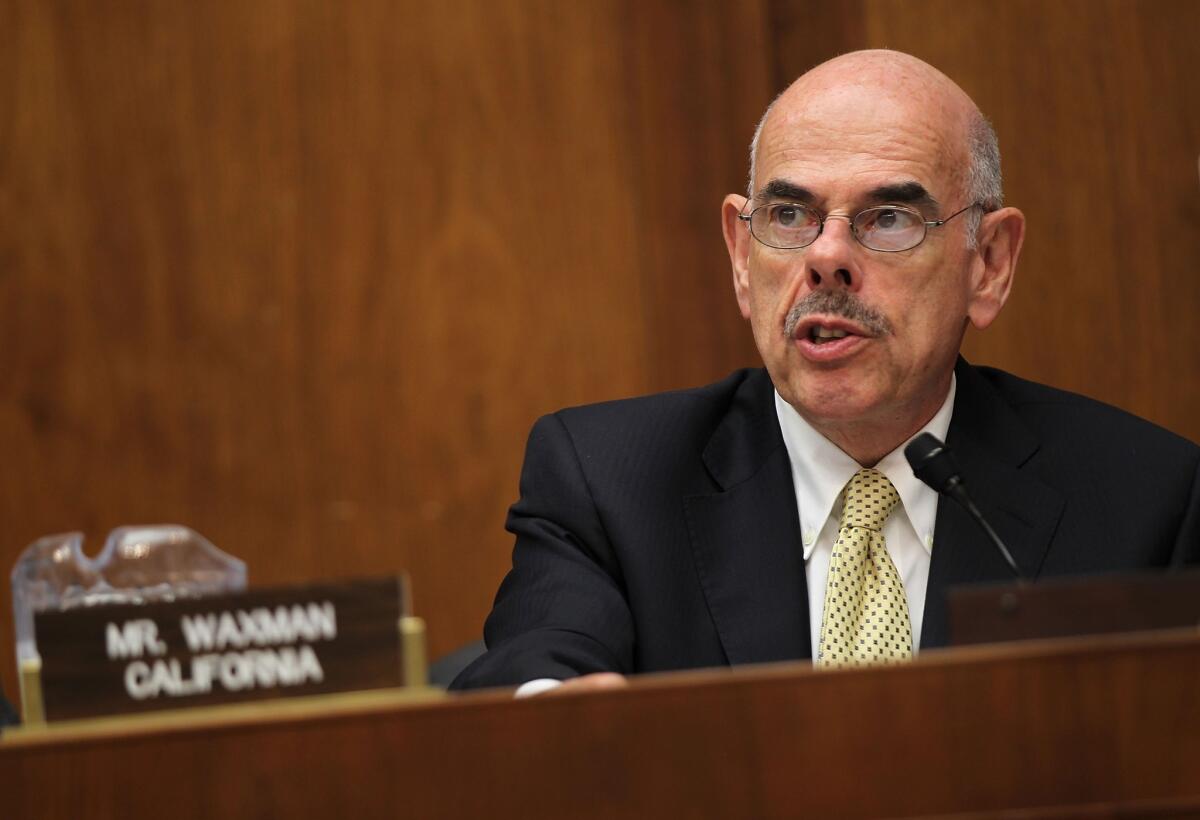Henry Waxman leads another quixotic charge for ‘net neutrality’

This post has been corrected, as noted below.
Entering the home stretch of his congressional career, Rep. Henry A. Waxman (D-Beverly Hills) is trying again to let the federal government regulate the Internet just enough to preserve the status quo.
And this legislation is almost guaranteed to meet the same fate as his last bill on the topic back in 2010: It will run into a brick wall of GOP opposition.
Waxman’s proposal would overturn a recent appeals court ruling that barred the FCC from enforcing the “net neutrality” -- excuse me, “open Internet” -- rules it adopted (with its two Republican appointees dissenting) late in December 2010. Until the FCC formally rewrote its net neutrality regulations, the Waxman bill would allow the commission to continue to enforce the 2010 strictures.
PHOTOS: How the Democrats can win back the House and keep the Senate -- in 6 steps
The latter imposed three general requirements on wired broadband Internet service providers such as Time Warner Cable and local phone companies: They couldn’t block customers from using legal websites, services or devices; they couldn’t discriminate unreasonably against a legal site or service’s traffic; and they had to disclose how they managed the congestion on their networks. Wireless broadband providers, such as Sprint, couldn’t block legal sites or services, and they couldn’t discriminate unreasonably against competing voice or video services.
The Times’ editorial board supported the rules, as do I. So did much of the telecom and tech industries, which helped craft them. The political reality, though, is that GOP lawmakers have long opposed federal regulations in general and Internet regulations in particular. And they’ve got a point: The Internet has prospered thanks to a rare combination of government largesse and regulatory forbearance.
Proponents of net neutrality say they’re just trying to protect the freedom and openness of the Internet. But they want to do so by restricting the freedom of ISPs. Granted, the rules would stop ISPs from acting as gatekeepers to or editors of the bounty of content and services online. So the FCC isn’t regulating for the sake of regulating; it’s curbing ISPs’ freedom for the sake or preserving everyone else’s online. But still, it’s regulating, and in the GOP playbook, that’s a nonstarter.
It’s worth noting that Waxman’s earlier attempt to legislate on net neutrality sought a middle ground between liberals who wanted ISPs to be classified as “common carriers” subject to strict federal control and libertarians who didn’t want the government to intervene in the market at all. The outcome would have looked a lot like what the FCC ultimately adopted, only to have the rules thrown out by an appeals panel.
Now, though, Waxman and his cosponsor, Rep. Anna G. Eshoo (D-Menlo Park), and their Senate counterpart, Edward Markey (D-Mass.), appear to be ignoring the opening that the appeals court gave them. The panel ruled that the FCC did, in fact, have the power to regulate ISPs without having to classify them as common carriers. But that power did not extend to the sort of blanket prohibition on blocking and discriminatory traffic management that the commission adopted.
The court seemed to be inviting the commission and its allies to come up with a new way to respond to complaints about ISPs restricting access to content or services or otherwise tipping the competitive scales for online businesses. Broadband ISPs haven’t done anything that would violate the 2010 rules since they were adopted. If and when they do, the question will be whether the actions could be reasonably characterized as anti-competitive, misleading to consumers or damaging to the spread of broadband. Those are the sorts of actions the FCC (or possibly the Federal Trade Commission) has the statutory authority to take action against.
That sort of approach -- one that’s based on enforcing existing strictures in the law rather than coming up with new rules -- might even have bipartisan support. Even if it doesn’t, it seems a more fruitful path to explore than trying to persuade Congress to let the FCC “regulate the Internet.”
[For the record, Feb. 4, 8:14 a.m.: The original version of this story misspelled Rep. Anna Eshoo’s last name.]
ALSO:
Playing politics with California’s drought
The Coke ad got it right: America is beautiful, in any language
Follow Jon Healey on Twitter @jcahealey and Google+
More to Read
A cure for the common opinion
Get thought-provoking perspectives with our weekly newsletter.
You may occasionally receive promotional content from the Los Angeles Times.







